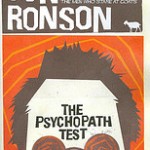In Devil in the White City, Larson provides a bone chilling account of a psychopath (Dr. H. H. Holmes) who terrorized visitors to the Chicago World’s Fair. What allowed him to pass undetected was his cunning ability to appear charming, trustworthy, empathic, and consummately human.
Cleckley describes psychopaths’ defining trait as “. . . a subtly constructed reflex machine which can mimic the human personality perfectly.” Holmes was so adept at camouflage that he successfully beguiled several women into signing over their assets.
This dangerous personality trait is present within modern corporations – albeit in a form that enacts different consequences. Psychopaths’ need for workplace dominance is reflected in their tendency to “. . . lie without remorse, steal credit for accomplishments, and [transfer] blame for their mistakes.” Furthermore, “They are prone to take risks without concern for ramifications.” In Snakes in Suits: When Psychopaths go to Work, Babiak and Hare estimate that about four percent of the executive suite is comprised of these type individuals. Psychopaths can turn effuse charm, and behave in a completely uninhibited fashion when circumstances don’t call for societal conformance (e.g., when they feel someone is beneath them in either social or professional standing).
Hare describes psychopaths as “sort of like a car with great power but weak brakes.” In the article “Bad Bosses: the Psycho-path to Success? Voigt further notes that the predatory psychopath (whose primary game is not necessarily illegal) is difficult to detect, because companies simply don’t want to acknowledge their existence. Even if presented with countervailing data, would the CEO (who no doubt has been the recipient of psychopaths’ flattery) believe the results? Their almost inhumane ability to successfully play an audience (despite their emotional lacuna) renders them difficult to detect, and even harder to later defeat.
Moreover, most people don’t want to admit they’ve been conned. They argue for the psychopaths’ “good traits,” charming demeanor, all the while discounting the complainant. At companies they may not be criminal, but they are certainly grand manipulators who enjoy possession, dominance, and sometimes sadistic attacks on their prey – absent the normal feelings of guilt and remorse. They never worry about trampled colleagues, which is what makes them such formidable adversaries.
Voigt argues: “psychopaths are drawn to powerful people and positions.” The serial killer in Devil in the White City was a handsome young doctor with penetrating blue eyes; one who under the right circumstances could make people easily trust him. Guileful tactics to reach the executive suite (and predatory behavior once there) help the psychopath to maintain power, and possibly to hire more people like themselves.





Recent Comments